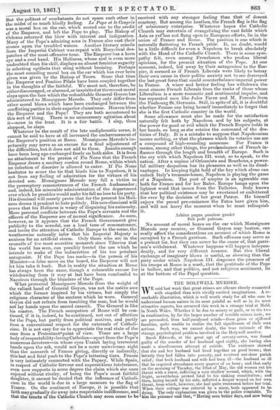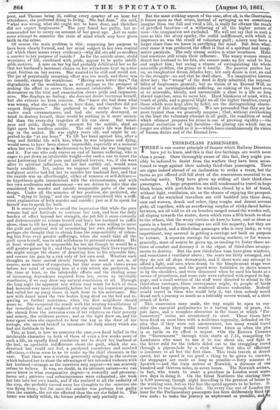THE HOLYWELL MURDER.
WE said last week that great crimes are oftener closely connected with stupifled than with vividly excited imaginations. A re- markable illustration, which is well worth study for all who care to understand human nature in its most painful as well as in its most attractive aspects, has occurred this week in a strange trial at Mold, in North Wales. Whether it be due to misery or guilt, or to the two in combination, by far the larger number of terrible crimes issue, we are persuaded, from half-paralyzed minds—from gross or stiffened faculties, quite unable to realize the full significance of their own actions. Such was, we cannot doubt, the true rationale of the strange psychological problem involved in the Holywell murder.
arah Edwards, at the great age of seventy-seven, was found guilty of the murder of her husband aged eighty, she having also made a simultaneous attempt at suicide. The evidence showed that she and her husband had lived together on good terms ; that latterly they had fallen into poverty, and received out-door parish relief; that both husband and wife had been ill—the husband so ill that he required attendance every quarter of an hour; and that early on the morning of Tuesday, the 22nd of May, the old woman cut his throat with a razor, inflicting a very shallow wound, which, with the fright, nevertheless proved fatal to his sinking constitution ; and then, laying herself by his side, inflicted a deeper wound on her own throat, from which, however, she had quite recovered before her trial. When their cottage was entered by a niece, both appeared to be dying. The only explanation was given to the police constable. To him the prisoner said that, "Having seen better days, and now being poor, and Thomas being ill, calling .every quarter of an hour for attendance, she preferred dying to living. She had done," she said, "what was wrong, what she ought not to have done, and therefore did not expect forgiveness." The jury found her guilty, but re- commended her to mercy on account of her great age. „Let us make some attempt to conceive the state of mind which may have given birth to the crime.
Of course the main problem is this : supposing her purpose to have been clearly formed, and her mind subject to her own control (of which there seems every evidence)—why did she add so needless a murder to her purpose of suicide ? Is for the suicide alone, stolid weariness of life, combined with pride, appear to be quite intelli- gible motives. A sore on her leg had probably debilitated her so far that her husband's incessant claims on her attendance kept up a con- stant friction on her nerves. She wanted to lie still and could not. The jar of perpetually recurring effort was too much, and there was no remedy, except the workhouse. "Having seen better days," the degradation of the workhouse, as well perhaps as the prospect of making the effort to move there, seemed intolerable. Her whole demeanour on the trial and examination shows pride and impassive- ness. She displays no feeling; she does not desire to excuse herself, but she evinces no keen remorse. She "knew she had done what was wrong, what she ought not to have done, and therefore did not expect forgiveness." She preferred to die rather than to live under such circumstances, and had she merely destroyed, or tried to destroy herself, there would be nothing in it more mourn- ful than the every-day tragedies of life can show. But weari- ness and pride, though they account for the suicide, shed no light upon the needless murder. The old man's life was flicker- ing in the socket. He was eighty years old, and might be ex- pected to die "at any hour." To lift her hand against him, after a long and faithful life with him, when he was helpless and dying, would seem to have been almost impossible, especially at a moment when her own life was so burdensome to her that she was longing to end it. For one who only craves an end of human suffering, who is eager to put down an intolerable weight—for such a one to court the most harrowing kind of pain and spiritual horrors, too, if she were alive to spiritual influences, in her last earthly act, would seem barely credible. Yet, unless we suppose that any passionate or malignant motive had led her to murder her husband first, and that the suicide was an afterthought, either of remorse or self-defence— an hypothesis quite inconsistent with the circumstances, and with her own confession and demeanour—we are driven to infer that she considered the murder and suicide inseparable parts of the same design. Under all the miseries of her position, she preferred, she said, "dying to living," and she apparently considered this a suffi- cient explanation of both murder and suicide; just as if to speak for herself was to speak for both.
It is scarcely possible to avoid the impression that while the poor woman had not fortitude to continue her task, and bear the daily burden of effort beyond her strength, she yet felt it more cowardly and dishonourable to release herself and leave her husband to suffer alone, than to lift her hand against him. If she were willing to incur the guilt and spiritual risk of terminating her own sufferings here, perhaps she thought that to shrink from the responsibility of releas- ing him from even greater sufferings, when she could take all the guilt upon herself, was to add selfishness to personal cowardice. He at least would not be responsible for her act though he would be a still greater gainer by it; and thus by terminating their lives together she might escape the shame of deserting him to his miserable fate, and ensure his gain by a risk only of her own soul. Whether such thoughts as these moved clearly through her mind or not, is, of course, mere matter of conjecture, but that some such vision swam before her mind of serving him at a risk which she preferred, for the time at least, to the intolerable efforts and the chafing sense of increasing dependence required from her, seems an inevitable conclusion, if we may draw any natural conclusion at all. Through the long night the apparent rest within easy reach for both of them had hovered ever more distinctly,before her as his impatient groans had called her up many times in each hour to his assistance. She saw with dazed mind the two bodies lying dead on the bed and re- quiring no further assistance, when the first neighbour should come m. She compared the result with the wearing humiliations of her immediate lot, and wondered why she should bear them. That she shrank from the intrusion even of her relatives on their poverty and misery, the evidence proves ; and as the light drew on, and the hour cisme when she expected to hear the key in the door of her cottage, she nerved herself to terminate the daily misery which she had not fortitude to bear.
This, at least, is how we conceive the case ;—a fixed belief in the intolerable character to both of them of even a few weeks more of such a life, an equally fixed resolution not to desert her husband at the last, an apathetic indifference about the guilt, which she un- derstood but could not feel, a paralyzed conscience and numbed affections,—these seem to us to. make up the chief elements in the case. That there was a certain generosity mingling in the motives which induced her to share the advantage of her intended violence with her husband—strange as the assertion may .appear—we can scarcely refuse to believe. It was, no doubt, in its intrinsic nature—we can never know in what comparative degree—a cowardly and presump- tuous act ; patience and submissiveness were exhausted; she took her fate into her own hands, and if she realized at all the audacity of the step, she probably turned away her thoughts to the miseries she was flying from; but for once the murder was perhaps less guilty than the suicide, the act she effected than the act she failed in. The latter was wholly selfish, the former probably only partially so. But the most striking aspect of the case, after all, is the illustration it forces upon us that crime, instead of springing as we sometimes imagine from too full and vivid a life, is really far oftener the result of petrified faculties—of a withering of all the higher nature of man—the imagination not excluded. We will not say that in such a case as this the stony apathy, the stolid indifference, with which it impresses us, was the result of voluntary guilt; misery may have a larger share than we know in petrifying the mind. But from what- ever cause it was produced, the effect is that of a spiritual and imagi- native paralysis. The only strong motive is utter weariness. Habi- tual emotions still retain their influence. The weary woman cannot desert her husband to his fate, she cannot make up her mind to live and neglect him; but seeing a chance of extinguishing the whole miserable problem, she grasps at it hastily. No passion pushes her on, no imaginative dream deludes her; her only desire is rest, an end to the struggle—an end that he shall share. No imaginative horrors deter her; the "wrong" of the deed is dryly admitted, the impossi- bility of forgiveness granted; but no vision of an Eternal Will, no dread of an inextinguishable suffering, no sinking of the heart even at so miserable, bloody, and unvenerable a close to a life so long shared together, seem to move her. Hard blankness of mind, with a touch of pride, and a general blight on all the higher faculties, except those which were kept alive by habit, are the distinguishing charac- teristics of this startling crime. We are persuaded that they are far more typical than we generally suppose ; that, without overlooking in the least the voluntary element in all guilt, the condition of mina which oftenest prepares for crime is one of growing rigidity ;—the gradual extinction of high faculties—the glazing eye which can no longer see either world as it is—which loses simultaneously its vision of human duties and of the Eternal love.































 Previous page
Previous page